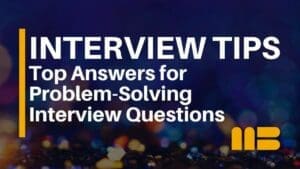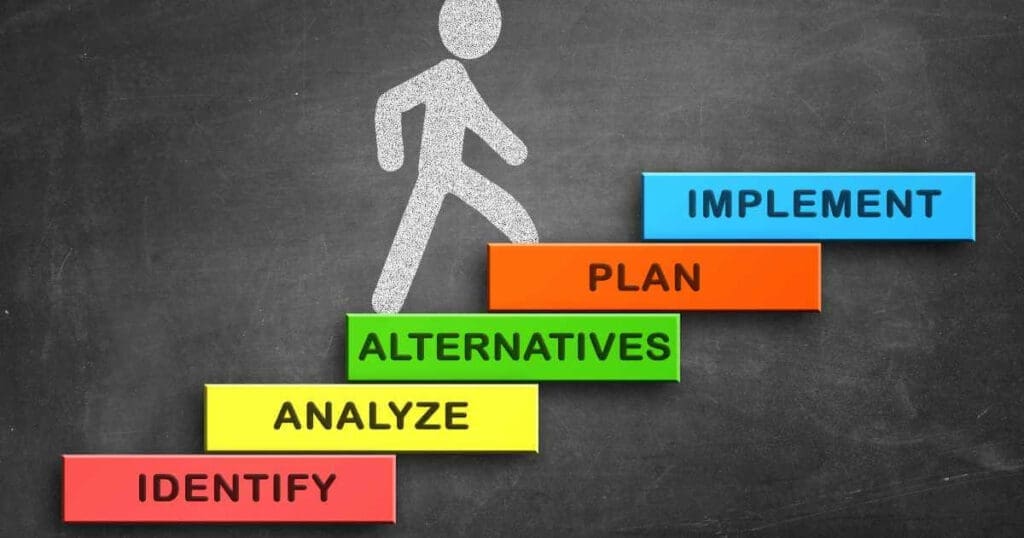Conquer the Interview: Master the Art of Problem-Solving with MatchBuilt
Interviews can be unpredictable, but your problem-solving responses don’t have to be. At MatchBuilt, we’re not just about finding jobs—we’re about empowering you to navigate the toughest interview questions with confidence and poise.
Navigate Your Interview With Precision:
- Unpack the Challenge: Learn to identify and articulate the problem with finesse.
- Craft Your Methodology: Develop a clear, logical approach to potential solutions.
- Lead with Solutions: Share your thought process and the steps to your successful outcome.
- Soft Skills Spotlight: Balance your technical savvy with the soft skills that showcase you as a complete candidate.
As the founder of MatchBuilt, I’ve seen how problem-solving skills can make or break an interview. They’re the litmus test of your practical know-how and your ability to collaborate under pressure.
Why Entrust Your Career to MatchBuilt?
- Depth of Experience: Insights honed from years of career coaching and talent development.
- Industry Acumen: Advice that’s informed by the realities of today’s job landscape.
- Tactical Expertise: Strategies that have placed numerous candidates in roles where they thrive.
Dive into this guide to turn every problem-solving question from a hurdle into a highlight of your interview. Join me, and let MatchBuilt illuminate the path to your next career milestone.
Strategies for Answering Problem Solving Interview Questions
In order to effectively answer problem-solving interview questions, candidates must demonstrate their critical thinking skills and ability to approach unexpected challenges. Here are some strategies to help candidates navigate these types of questions:
Understand the Problem
The first step in solving any problem is to understand it fully. Candidates should listen carefully to the hiring manager’s description of the situation and ask questions to clarify any uncertainties. This will help them identify potential problems and determine the best way to approach the situation.
Brainstorm and Analyze Options
Once the problem is clear, candidates should brainstorm possible solutions and analyze the pros and cons of each option. They can draw from their past experiences to identify similar situations they’ve faced and the solutions they implemented. This demonstrates their ability to think critically and come up with new ideas.
Implementation
After evaluating their options, candidates must make a decision and explain the reasoning behind it. It’s important to emphasize how they would implement their chosen solution, taking into account potential obstacles and risks. This demonstrates their ability to make informed decisions and execute plans effectively.
Emphasize Soft Skills
In addition to technical skills, hiring managers are often interested in a candidate’s soft skills. This includes communication, teamwork, adaptability, and problem-solving abilities. Candidates should showcase how their soft skills complement their technical abilities and help them handle unexpected challenges.
Candidates can use the STAR method (Situation, Task, Action, Result) to structure their answers and clearly and concisely explain their experience. By using this method, they can provide a sample answer that effectively demonstrates their approach to problem-solving.
In summary, candidates can effectively showcase their problem-solving abilities during the hiring process by understanding the problem, brainstorming and analyzing options, making informed decisions, and emphasizing soft skills. By preparing for various types of questions and drawing from past experiences, candidates can provide specific and effective example answers that demonstrate their ability to solve potential problems in a specific role.
Top 8 Problem Solving Interview Questions and Example Answers
1. Describe a Situation When You Faced a Difficult Problem at Work and How You Solved It
Hiring managers ask this question to understand how candidates handle unexpected challenges and difficult situations. An example answer to this question could be:
In my previous job as a software engineer, we encountered an unexpected challenge during a product launch. Our team had worked on a feature for months, but it wasn’t functioning as expected during the testing phase. After analyzing the code and conducting further tests, we realized that there was a compatibility issue with a third-party software we had integrated.
To solve the problem, I led a cross-functional team to identify a workaround that would allow us to launch the product on time. We prioritized features and made strategic decisions to ensure the most critical functionality worked smoothly. By collaborating closely with team members and thinking creatively, we overcame this challenge and delivered a successful product launch.
2. Explain a Time When You Had to Make a Decision Without All the Information You Needed
This question helps hiring managers evaluate candidates’ ability to make informed decisions under pressure. An example answer to this question could be:
In my previous role as a project manager, we were working on a tight deadline for a client deliverable. During the final stages, we encountered a technical issue that we hadn’t anticipated, and we realized that we didn’t have all the information we needed to solve the problem.
I had to make a decision quickly to keep the project on track. I relied on my technical expertise and consulted with team members to gather as much information as possible. Based on the available information, I made a decision that allowed us to complete the project on time. Afterward, we conducted a post-mortem analysis to identify the root cause of the problem and make changes to our process to prevent similar issues in the future.
3. Tell Me About a Time When You Had to Work with Someone Who Was Difficult to Get Along With
This question helps hiring managers evaluate candidates’ ability to collaborate and handle conflict. An example answer to this question could be:
In my previous job, I worked on a cross-functional team with a colleague with a very different work style than mine. We had difficulty communicating effectively, which resulted in misaligned priorities and conflicting expectations.
To solve the problem, I set up a one-on-one meeting with the colleague to discuss our differences and find common ground. We identified areas where we could collaborate more effectively and established a communication plan to prevent similar misunderstandings in the future. By taking the initiative to address the problem and finding a mutually beneficial solution, we were able to work together more effectively and achieve our goals.
4. Describe a Time When You Had to Analyze Information and Make a Recommendation
This question helps hiring managers evaluate candidates’ analytical skills and ability to make informed recommendations. An example answer to this question could be:
In my previous role as a financial analyst, I was tasked with analyzing a large data set and making a recommendation on a new investment opportunity. I conducted extensive research and analysis, taking into account market trends, industry benchmarks, and financial projections.
Based on my findings, I recommended that we pursue the investment opportunity, highlighting the potential for high returns and the alignment with our company’s long-term strategy. The executive team ultimately approved my recommendation, and the investment turned out to be very successful.
5. Tell Me About a Time When You Had to Solve a Problem with Limited Resources
This question is often asked to test a candidate’s ability to work under pressure and come up with creative solutions. One example answer could be:
In my previous role, we had a tight budget and a deadline to launch a new product. Our team was struggling to come up with a cost-effective solution. I suggested we contact local universities to see if any students were interested in working on the project as part of their coursework.
We were able to find a group of talented students who worked on the project for a fraction of the cost and delivered exceptional results on time.
6. Explain How You Would Approach a Problem That You Have Never Encountered Before
This question assesses a candidate’s critical thinking and problem-solving skills. An example answer could be:
If I encountered a problem I’d never seen before; my first step would be gathering as much information as possible.
I would research the problem and try to understand its root cause.
Then, I would brainstorm possible solutions and evaluate each one’s feasibility and potential impact. Finally, I would seek input from other team members and stakeholders to make an informed decision.
7. Describe a Time When You Had to Manage a Crisis Situation
This question tests a candidate’s ability to remain calm and composed in high-pressure situations. An example answer could be:
During my time as a project manager, we experienced a sudden system outage that lasted for several hours.
I immediately gathered my team and assigned specific tasks to each member to investigate and resolve the issue. I also communicated regularly with our clients, keeping them informed of our progress and estimated timeline for resolution.
By working together and maintaining open communication, we resolved the issue and minimized its impact on our clients.
8. Explain a Time When You Identified a Problem Before Anyone Else and Took Steps to Solve It
This question tests a candidate’s proactive thinking and initiative. An example answer could be:
In my previous role, I noticed that our team was spending excessive time on manual data entry.
I researched possible solutions and presented a proposal to my supervisor, suggesting we invest in automation software. After gaining approval, I worked with our IT team to implement the new software, which significantly increased efficiency and productivity for our team.
Problem-Solving Interview Questions: Your Top FAQs Answered
As problem-solving skills are highly valued in most job roles, it’s no surprise that problem-solving interview questions are common in job interviews. However, these types of questions can be challenging to answer effectively, leaving job seekers with a lot of questions. In this section, we’ll address some of the most frequently asked questions about problem-solving interview questions and provide answers to help candidates confidently navigate these types of questions.
Interviewers ask problem-solving questions to assess candidates' ability to think critically, handle challenges, and develop creative solutions. These skills are often essential in the workplace, and employers want to ensure they hire someone who can contribute to the company's success.
Candidates may find it challenging to come up with specific examples that showcase their problem-solving skills. Additionally, they may struggle to articulate their thought process or communicate their solutions effectively.
The best way to answer problem-solving questions is to use a structured approach. Begin by clarifying the problem, brainstorming possible solutions, evaluating each option, and selecting the best solution. It's also essential to communicate your process and reasoning effectively.
You can expect a range of problem-solving questions in a job interview, from general questions about past experiences to hypothetical scenarios that test your critical thinking skills. Examples may include questions about difficult situations you've faced, how you've solved problems with limited resources, or how you approach problems you've never encountered before.
To prepare for problem-solving questions, review the job description and identify any skills or experiences that are essential for the role. Think of specific examples from your past experiences that showcase your problem-solving skills. Practice using the STAR method to structure your answers and communicate your thought process clearly.
It's okay if you don't know the answer to a problem-solving question. Instead, focus on your approach to problem-solving and how you would go about finding a solution. Employers are often more interested in how you think than whether you have all the answers.
If you don't have work experience, think of examples from your academic or personal life that showcase your problem-solving skills. For example, you may have solved a complex problem in a group project, volunteered for a community organization, or participated in a hackathon.
Problem-solving questions can be used for all types of jobs, from entry-level to executive positions. Employers want to ensure that their employees can handle challenges and come up with innovative solutions regardless of their job titles or responsibilities.
Mastering Problem-Solving Interview Questions: Key Takeaways for Job Seekers
Problem-solving interview questions provide hiring managers with valuable insights into a candidate’s problem-solving skills and ability to handle challenging situations. As a candidate, answering these questions with a specific example of a time when you faced a potential problem and describing your problem-solving process can give you a good chance of impressing the hiring manager.
While technical interviews often focus on a candidate’s technical abilities, behavioral questions, including problem-solving questions, provide insight into a candidate’s approach and experience with relevant work-related problems. By emphasizing your problem-solving process and relevant information, you can demonstrate to the hiring manager that you are among the right candidates for the job.
At MatchBuilt Executive Search, we understand the importance of problem-solving interview questions in hiring. Our expertise in helping clients find candidates with the right skills and experience has given us a unique perspective on the best way to approach these questions. By providing innovative and creative solutions to unexpected challenges, our candidates have a better chance of succeeding in the interview process and landing their dream job.
So, whether you are a hiring manager looking for the right candidates or a job seeker looking to showcase your problem-solving skills, understanding the importance of problem-solving interview questions and how to approach them can make all the difference.
Looking for more career advice and tips? Check out our blog for articles on dealing with difficult coworkers, finding the best careers for your personality type, and being more assertive at work. We also cover industry-specific topics, such as the best-paying jobs in homebuilding. Browse our blog for insights and strategies that can help you achieve career success.





